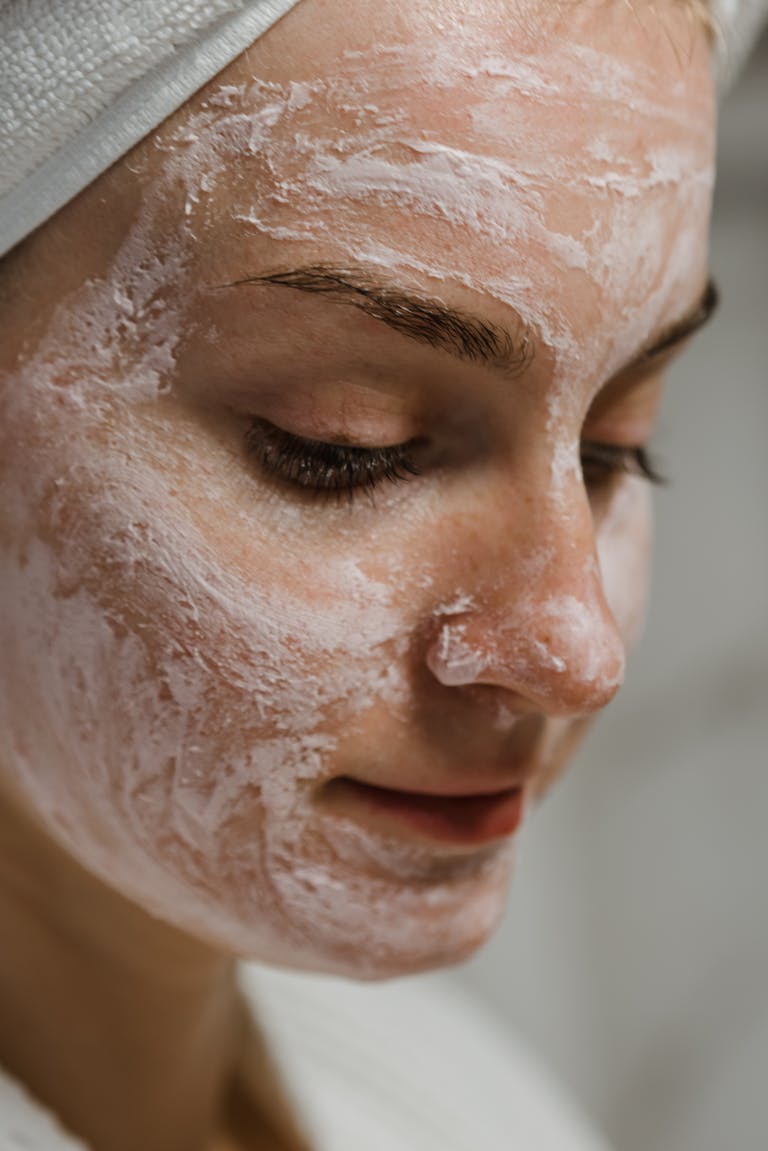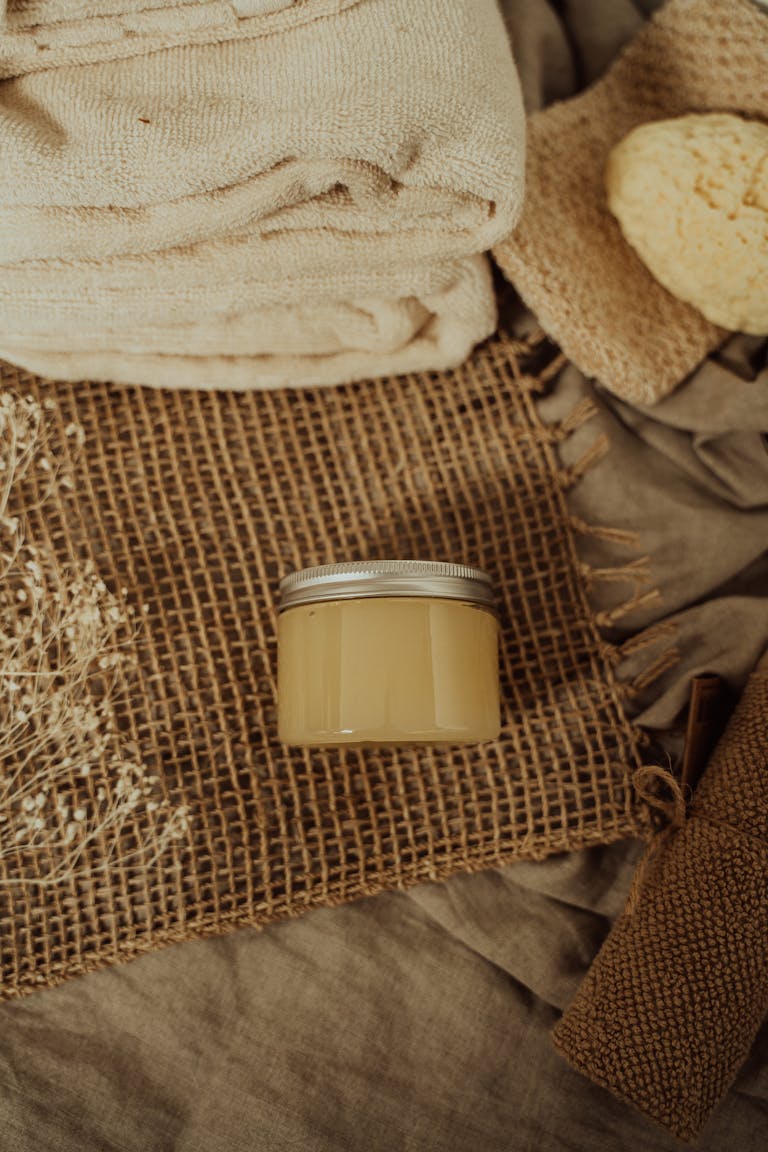
As I stood in the skincare aisle of my local Superdrugs, overwhelmed by the array of products promising radiant, healthy skin, two words caught my eye: organic and natural. Like many of you, I’ve often wondered about the differences between these terms. Are they just clever marketing ploys, or do they represent genuinely different approaches to skincare? This confusion led me on a journey of discovery, and I’m excited to share my findings with you.
In the ever-evolving world of beauty and skincare, the terms ‘organic’ and ‘natural’ often confuse consumers like us. While both sound appealing and conjure images of pure, wholesome products, they are not interchangeable. As someone who’s struggled with sensitive skin, is battling with infertility and has a desire to make environmentally conscious choices, I’ve learned that understanding the organic vs natural skincare debate is crucial for making informed decisions about what we put on our bodies.
Join me as we unravel the mysteries behind these labels, explore their differences, and discover how to choose the best products for our skin and our values. Whether you’re a skincare novice or a beauty enthusiast, this guide will help you navigate the sometimes confusing world of organic and natural skincare.
Understanding Natural Skincare
Natural skincare products are derived from plant, mineral, or animal sources without synthetic compounds. However, the term “natural” is not strictly regulated in the cosmetics industry. This means that products labelled as natural may still contain some synthetic ingredients or preservatives.
Key points about natural skincare:
- Ingredients Sourced from Nature: Natural skincare products primarily contain ingredients found in nature. These can include plant extracts, essential oils, herbs, and minerals. For example, you might find products with aloe vera, coconut oil, shea butter, or clay. However, it’s important to note that “natural” doesn’t always mean “safe” or “gentle” – some natural ingredients can be irritating to certain skin types.
- Potential for Synthetic Components: While the core ingredients are natural, these products may still include some synthetic components. These are often used for preservation, stabilisation, or to enhance the product’s texture. Common examples include parabens, phthalates, or synthetic fragrances. The presence of these doesn’t necessarily make a product harmful, but it’s something to be aware of if you’re seeking a wholly natural routine.
- Lack of Chemical-Free Guarantee: The term “natural” doesn’t guarantee a product is free from chemicals. In fact, everything – including natural ingredients – is made up of chemicals. What’s more important is understanding which chemicals are present and their potential effects on your skin and health.
- Less Stringent Regulations: Unlike “organic”, the term “natural” isn’t tightly regulated in the skincare industry. This means there’s no universally accepted definition of what qualifies as a natural product. Some brands may use the term liberally, even if only a small percentage of their ingredients are truly natural.
- Varying Percentages of Natural Content: Products labelled as “natural” can contain anywhere from 1% to 100% natural ingredients. It’s worth checking ingredient lists and looking for brands that are transparent about their formulations.
- Potential for Allergies: Natural doesn’t always mean hypoallergenic. In fact, many natural ingredients (like essential oils or plant extracts) can cause allergic reactions in some individuals. It’s always wise to patch-test new products, regardless of their “natural” status.
- Environmental Considerations: While natural ingredients are often perceived as more environmentally friendly, this isn’t always the case. The sourcing and processing of natural ingredients can sometimes have significant environmental impacts. It’s worth researching brands that prioritise sustainable sourcing practices.
Understanding these nuances about natural skincare can help you make more informed decisions when choosing products. While natural ingredients can offer many benefits, it’s important to look beyond the “natural” label and consider the full ingredient list and your individual skin needs.

Defining Organic Skincare
Organic skincare takes the concept of natural a significant step further. These products are made from ingredients that are organically grown, and cultivated without the use of synthetic pesticides, herbicides, genetically modified organisms (GMOs), or artificial fertilisers. Organic skincare is subject to strict regulations and certification processes, making it a more tightly controlled category than natural skincare.
Characteristics of organic skincare:
- Certified Organic Ingredients: For a skincare product to be labelled as organic in the UK, it must contain a high percentage of organic ingredients (typically 95% or more for Soil Association certification). These ingredients are grown using sustainable, organic farming methods that prioritise soil and water conservation and promote biodiversity.
- Rigorous Certification Process: Organic skincare products undergo thorough scrutiny by recognised certification bodies. In the UK, look for certifications from organisations like the Soil Association, COSMOS, or Ecocert. These certifications ensure that products meet strict standards for organic content, environmental impact, and ethical production.
- Minimal Processing: Organic skincare typically uses ingredients that are minimally processed to maintain their natural integrity and potency. This often results in products that are rich in natural vitamins, minerals, and antioxidants.
- Free from Synthetic Chemicals: Organic products are formulated without synthetic preservatives, fragrances, colours, or petroleum-derived ingredients. Instead, they rely on natural preservatives like plant extracts or essential oils to maintain product stability.
- Environmentally Friendly Production: Organic farming practices are designed to respect the environment, conserve water, reduce pollution, and promote sustainable agriculture. This extends to the entire production process, including packaging, which often uses recyclable or biodegradable materials.
- Cruelty-Free: Most certified organic skincare brands are also cruelty-free, meaning they don’t test their products on animals. This aligns with the ethical considerations that often motivate consumers to choose organic products.
- Potential for Higher Nutrient Content: Some studies suggest that organically grown plants may have higher levels of certain nutrients and antioxidants compared to conventionally grown crops. This could potentially translate to more nutrient-rich skincare products.
- Strict Regulations on Allowable Ingredients: Certified organic skincare must adhere to a limited list of approved ingredients and processes. This often results in simpler formulations with fewer ingredients, which can be beneficial for those with sensitive skin or those looking to minimise their exposure to different substances.
- Transparency in Labelling: Organic certification requires clear labelling of organic content. Products must specify the percentage of organic ingredients, making it easier for consumers to understand exactly what they’re buying.
- Holistic Approach to Beauty: Organic skincare often aligns with a broader philosophy of holistic health and wellness, considering the impact of products not just on the skin, but on overall health and the environment.
Understanding these aspects of organic skincare can help you appreciate the rigorous standards behind the ‘organic’ label and make more informed choices about your skincare routine. While organic products often come with a higher price tag, many consumers find the potential benefits to their skin, health, and the environment to be worth the investment.

Organic vs Natural Skincare: The Key Differences
- Cultivation Methods: Organic ingredients are grown using sustainable farming practices, while natural ingredients may be conventionally farmed.
- Certification: Organic products require certification from recognised bodies like the Soil Association in the UK. Natural products don’t necessarily need certification.
- Ingredient Processing: Organic skincare typically uses minimally processed ingredients, whereas natural skincare may include more heavily processed components.
- Environmental Impact: Organic farming practices are generally more environmentally friendly than conventional methods used for some natural ingredients.
- Preservatives: Organic products often use natural preservatives, while some natural products may contain synthetic preservatives.
Making the Right Choice
When navigating the organic vs natural skincare landscape, making the right choice involves more than just understanding the definitions. It requires careful consideration of various factors to align your skincare routine with your personal needs, values, and circumstances.
- Assess Your Skin Type and Concerns: Begin by understanding your skin type (oily, dry, combination, sensitive) and any specific skin concerns you have (acne, ageing, hyperpigmentation, etc.). Both organic and natural products can address various skin issues, but the effectiveness may vary. For instance, if you have sensitive skin, you might find that certified organic products with fewer ingredients are less likely to cause irritation.
- Consider Your Budget: Organic skincare products often come with a higher price tag due to the costly certification process, more expensive farming methods, and typically smaller-scale production. Natural products can vary widely in price. Determine how much you’re willing to invest in your skincare routine and whether the potential benefits of organic products justify the extra cost for you.
- Evaluate Your Environmental Values: If environmental sustainability is a priority for you, certified organic products often have the edge. They’re produced using farming methods that are generally more environmentally friendly. However, some natural skincare brands also prioritise sustainability, so look into individual brand practices if this is important to you.
- Read Labels Carefully: Whether you choose organic or natural, always read product labels thoroughly. For organic products, check for credible certifications. For natural products, look at the full ingredients list to understand what you’re actually putting on your skin. Be wary of greenwashing – marketing tactics that make products appear more natural or eco-friendly than they actually are.
- Consider Allergies and Sensitivities: If you have known allergies or sensitivities, neither organic nor natural automatically means “safe” for you. Natural ingredients can be just as allergenic as synthetic ones for some people. Always patch-test new products and be particularly cautious with essential oils, which are common in both organic and natural skincare.
- Think About Product Efficacy: The effectiveness of a product depends on its formulation and how it interacts with your unique skin, not just whether it’s organic or natural. Some synthetic ingredients have been extensively researched and proven effective, while some natural ingredients may lack substantial scientific backing. Consider products that blend the best of both worlds if efficacy is your top priority.
- Reflect on Your Overall Lifestyle: Your skincare choices might be part of a broader lifestyle approach. If you prioritise organic food and natural living in other areas of your life, organic skincare might be a natural extension of these values.
- Research Brand Ethics: Look beyond the organic or natural label and consider the overall ethics of the brands you’re considering. Some factors to consider include animal testing policies, fair trade practices, and commitment to sustainability.
- Consult a Professional: If you’re unsure about what’s best for your skin, consider consulting a dermatologist or skincare professional. They can provide personalised advice based on your skin type and concerns.
- Start Slowly and Observe: Whether you choose organic or natural (or a mix of both), introduce new products into your routine gradually. This allows you to observe how your skin reacts and makes it easier to identify any products that may not agree with your skin.
Remember, there’s no one-size-fits-all solution in skincare. What works wonderfully for one person might not suit another. The key is to be an informed consumer, listen to your skin, and be willing to adjust your routine as needed. Whether you opt for certified organic, carefully selected natural products, or a combination of approaches, the most important factor is choosing formulations that work well for your skin and align with your personal values and lifestyle.

Conclusion
As I reflect on my journey through the maze of organic and natural skincare, I’m reminded of that moment of confusion in the skincare aisle. The path from bewilderment to understanding hasn’t always been straightforward, but it’s been incredibly enlightening.
Understanding the organic vs natural skincare distinction has empowered me to make choices that align not just with my skincare goals, but also with my personal values. I’ve learned that while organic products offer the assurance of strict regulations and environmentally friendly practices, thoughtfully selected natural products can also be excellent choices for both skin health and conscience.
What I’ve come to appreciate most is that there’s no one-size-fits-all solution. Some days, I reach for my certified organic moisturiser, revelling in the knowledge of its pure, minimally processed ingredients. Other times, I opt for a natural serum that combines the best of nature with carefully chosen synthetic components for optimal efficacy.
The key, I’ve discovered, is to look beyond the labels and really understand what we’re putting on our skin. It’s about being an informed consumer, reading those ingredient lists (even when they seem like a foreign language at first!), and not being afraid to ask questions or do a bit of research.
I’ve also learned the importance of listening to my skin. It’s a unique organ, after all, with its own likes and dislikes. What works wonders for my friend might not suit me at all, regardless of whether it’s organic, natural, or something in between.
As I continue on my skincare journey, I’m excited to keep exploring, learning, and refining my routine. I hope that by sharing my experiences and insights, I’ve helped you feel more confident in navigating your own path through the world of organic and natural skincare.
Remember, whether you choose certified organic, carefully selected natural products, or a mix of both, the most important factor is that your choices work well for your skin and resonate with your personal ethos. After all, true beauty isn’t just skin deep – it’s a reflection of how we care for ourselves, others, and the world around us.
So, the next time you find yourself standing in that skincare aisle, feeling a bit overwhelmed by the choices, take a deep breath. Armed with knowledge and in tune with your own needs and values, you’re well-equipped to make decisions that are right for you. Here’s to healthy, happy skin and a skincare routine that makes you feel good inside and out!






